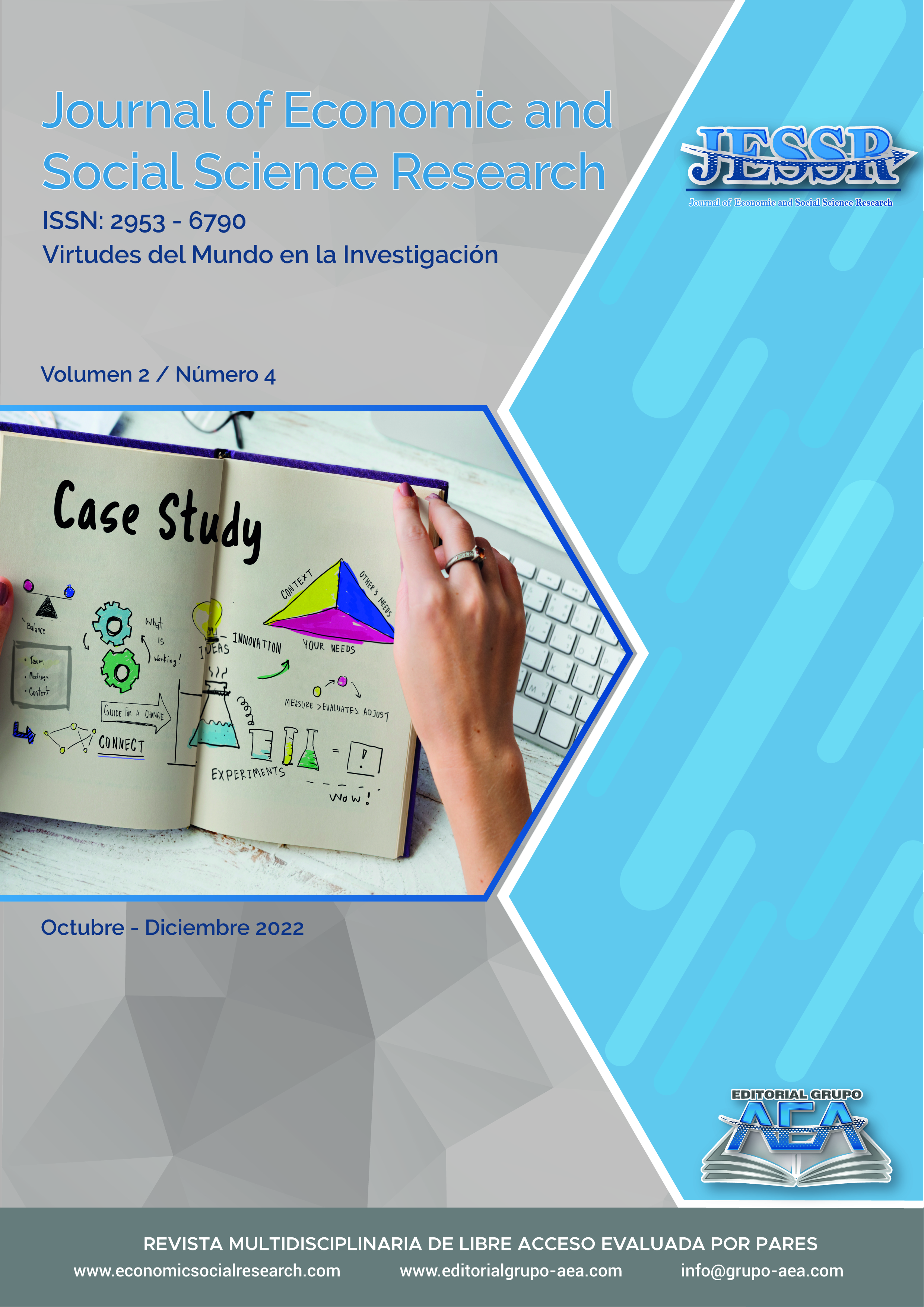The importance of leadership in achieving business goals.
Main Article Content
Abstract
This study analyzed the importance of leadership in organizations and found that it is becoming increasingly important over time. Leadership has a direct impact on the performance of members of an organization or work team by providing guidance to achieve specific objectives and goals. The main objective of this analysis is to raise awareness of the value of leadership for both individuals and organizations. A mixed methodological approach was used, combining qualitative and quantitative analysis, with an exploratory design and documentary research through literature review, with a descriptive scope and a deductive approach. The findings suggest that corporate leadership and employee morale have a significant impact and strategies should be implemented to address this issue. It is essential for La Concordia companies in the 2022 period to have effective leaders who can guide their team towards achieving specific goals and achieve the desired success. It is essential that studies and analyses be conducted in order to improve and develop leadership skills in the companies to be able to meet the planned goals and objectives.
Downloads
Article Details
Section

This work is licensed under a Creative Commons Attribution-NonCommercial 4.0 International License.
How to Cite
References
Amador Ureta , L. F., & Herreira Villalobos , H. S. (2018). Líderazgo democrático y calidad de gestión en las empresas comerciales. Barranquilla: Universidad de la Costa.
CANO, Y. (26 de 03 de 2015). Liderazgo y motivación. Quetzaltenango, Guatemala, Guatemala.
Chavez, M. (2013). La Influencia del Liderazgo en el Clima Organizacional,. Maestría en Desarrollo del Talento Humano. Obtenido de http://hdl.handle.net/10644/3244
Chiluisa, M. (2018). La hora. Obtenido de https://www.lahora.com.ec/noticias/un-empresario-que-le-aposto-a-la-concordia/
Gabriel Pazmiño, M. B. (2016). LOS ESTILOS DE LIDERAZGO Y SU INFLUENCIA EN EL DESARROLLO EMPRESARIAL: CASO PYMES DELA PROVINCIA DE TUNGURAHUA-EUADOR. Ambato: Revista PUCE. issn 1390 - 7719 Núm. 103.
Gabriela Baquerizo Neira, E. L. (2018). EL LIDERAZGO POLÍTICO ECUATORIANO EN LOS MEDIOS DÍGITALES: UN ESTUDIO DEL INTERVALO 2010-2015 EN EL UNIVERSO Y EL COMERCIO . Guayaquil : Austral Comunicación.
González, D. J. (2018). Estilo de liderazgo en las pymes del sector comercial . Durango : Colparmex .
Herrera-Enríquez, G., Casanova-Villalba, C., Herrera-Sánchez, M., Navarrete-Zambrano, C., & Ruiz-López, S. (2021). Estructura del sistema de información para el análisis multidimensional de la resiliencia socioecológica a través de Fuzzy AHP. Revista Ibérica de Sistemas e Tecnologias de Informação, (E39), 77-90.
Jorge Brito, M. (2016). La ética y los estilos de liderazgos . Guayaquil: INNOVA Research Journal.
Lewin, k. (2000). Modelo de liderazgo. Obtenido de https://congresosfnn.com/wp-content/uploads/2021/03/congreso-iberoamericano-liderazgo/ModdeLiderazgoLewinCOMUNESC.pdf
LUGO, M. S. (2014). Propuesta de plan de capacitación sobre liderazgo. Trabajo de titulacion de grado. Obtenido de http://repositorio.puce.edu.ec/bitstream/handle/22000/9088/TESIS%20Mishell%20Sanchez.pdf?sequence=1
MARAÑÓN, F., BARRIENTOS, R., & FRÍAS, L. G. (02 de 08 de 2021). Imagen, confianza y liderazgo en voceros públicos durante la pandemia covid-19. Caso: Nuevo León, México. Lima, Lima, Perú.
Mello, M. F. (2015). La importancia del liderazgo sostenible como una estrategia de las organizaciones . Medellín : Revista Ciencias Estratégicas.
Meza, M., & Flores , I. (2014). Liderazgo transformacional. Revsita Educacion, 1(28), 101-115. Obtenido de http://www.redalyc.org/articulo.oa?id=44030587005
Miguel García, A. G. (21 de 04 de 2021). scielo. Obtenido de scielo: http://scielo.senescyt.gob.ec/scielo.php?pid=S1390-86182021000100055&script=sci_arttext
Mojica, J. A. (2017). El liderzgo y su evolución: una revisión de sus principales teorías, enfoques y modelos desde el siglo xx hasta la actualidad. Bogotá: Alta Gerencia (1059).
Radrigan, M., & Davila , M. (2022). Gestión y Liderazgos en los Emprendimientos Sociales. Revista Latinoamericana, 11(32). Obtenido de http://www.redalyc.org/articulo.oa?id=30524549009
Sandoval, N. L. (2016). Métodos y técnicas de investigación cuantitativa y cualitativa. Universidad de Guadalajara: Sistema de Universidad Vitual .
Scharch Kirberg, A. (2021). Dirección de ventas: liderazgo en el siglo XXI. Buenos Aires: 2012 Fundación Universidad de Palermo.
Solano, A. C. (2015). Teoría y evaluación del liderazgo . Buenos Aires : Paidós .
Solarte, M. G. (2015). Formulación de un modelo de liderazgo desde las teorías organizacionales. Cali : Entramado.
Tardivo, G. (2017). El uso del método histórico-comparativo en el análisis del liderazgo político. Murcia : Revistas Um.
Trabajo, O. M. (2021). Liderazgo empresarial durante la crisis del COVID-19. Ginebra: Copyright.
Villalba, C. I. C., Sánchez, J. E. I., Valdez, L. A. M., & Vera, N. C. M. (2022). Importancia de los principios éticos en los negocios globales. In Resultados Científicos de la Investigación Multidisciplinaria desde la Perspectiva Ética (pp. 24-40). Editorial Grupo AEA.
Villalba, C. I. C., Sánchez, M. J. H., Soto-Soto, L., Gamarra-Moreno, J., Cervantes, L. T., & Núñez, D. T. (2021). Accounting Management for Decision Making. Journal of Positive Psychology and Wellbeing, 5(4), 74-86.
Weinstein, J., & Muñoz, G. (2018). Cómo cultivar el liderazgo educativo: trece miradas. Santiago de Chile: Salesianos Impresores S.A.





